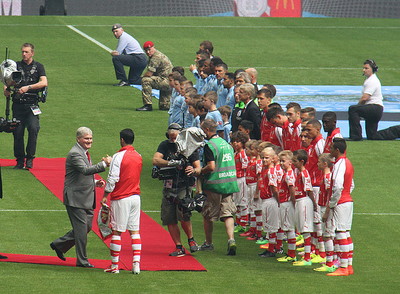
In the world of football, there are 2 different types of mascots: the people dressed up in fluffy costumes that run up and down the touchline before matches and the kids that walk out with the players ahead of the match, usually enjoying a kick-about with their heroes during the warm-up. This piece is very much about the latter topic, with the former covered elsewhere on the site.
If you’ve ever so much as even casually observed a professional football match then you’ll doubtless have seen the young kids running out with the players before the match gets underway. How much you’ve properly thought about them will determine whether you’ve ever considered the likes of when it all began, how you or your child can become a club mascot and what is involved in the overall experience. We’ll do our best to answer those questions here.
We also look at the costs of becoming a mascot in the Premier League and Championship and ask whether it is fair that some clubs give experiences for free while others charge often astronomical amounts.
Premier League & Championship Clubs With Free Child Mascots
| Club | Ages | Details | |
|---|---|---|---|
| Premier League | |||
| Arsenal | 4-11 | For junior members only + 4 match tickets & club vouchers | |
| Chelsea | 6-12 | For junior members only | |
| Fulham | 5-12 | For junior members only, does not include kit or tickets | |
| Huddersfield Town | 5-12 | For junior members only, includes 2 tickets but no kit | |
| Liverpool | 4-11 | For junior members only | |
| Manchester City | 5-12 | For junior members only | |
| Manchester United | 7-14 | For junior members only | |
| Newcastle United | 5-13 | For junior members only | |
| Southampton | 5-14 | For junior members only, 2 tickets, no kit provided | |
| Championship | |||
| Derby County | 5-12 | Rams squad members, includes 2 tickets, no kit | |
| Leeds United | 5-12 | Junior members and season ticket holders | |
| Wigan Athletic | Up To 18 | 1 free mascot selected from under 18 season ticket holders, hospitaltity packages for others | |
Data in this table is for the 2018-19 league season
Premier League & Championship Clubs That Charge For Child Mascots
| Club | Cost | Ages | Details |
|---|---|---|---|
| Premier League | |||
| Everton | £718 | 5-13 | Includes full kit and 2 tickets, plus 1 free junior member / game |
| West Ham United | £700 | 6-12 | Includes 2 tickets but no kit |
| Leicester City | £600 | 7-11 | Includes 4 tickets, meal and full replica kit |
| Tottenham Hotspur | £405 – £255 | 5-14 | Three categories A-C, different prices mid-week vs weekend, includes 2 tickets and replica kit |
| Wolverhampton Wanderers | £395 – £290 | 4-11 | 3 game categories, Platinum, Gold & Silver – Includes 4 tickets and full replica kit |
| Crystal Palace | £375 (Gold) £100 (Silver) | 5-14 | Gold includes 3 tickets, kit & more, silver is walk-out only |
| Brighton and Hove Albion | £350 (Captain) £250 (Standard) | 7-12 | Both include kit and 2 tickets, captain package leads team out with captain + other benefits |
| Burnley | £300 (VIP) £40 (Escort) | 5-12 | VIP includes kit, 4 tickets, favourite player walk out & more, escort is walk out only |
| Cardiff City | £255 | 4-10 | Includes kit, 2 tickets and other benefits |
| Watford | £250 – £180 | 5-12 | Three categories, A-C, 3 tickets but no kit included |
| Bournemouth | £185 (A) £150 (B) | 4-12 | Must be junior member, category A matches more expensive (e.g Liverpool). No kit or match ticket included. |
| Championship | |||
| Nottingham Forest | £780 – £600 | 7-12 | Platimum to bronze game grades, 4 hospitality tickets & full kit |
| Sheffield Wednesday | £600 or £240 | 5-13 | Standard & VIP packages available, only VIP comes with tickets (3), neither get kit free |
| Birmingham City | £539 – £99 | 5-14 | Four match categories, two main packages with 2-3 sub-categories, more expensive packages (Beau) comes with kit, 4 tickets & benefits – season holder discount |
| Swansea City | £479 or £420 | 6-12 | Mid-week matches cheaper, comes with replica kit and 4 tickets |
| Millwall | £420 | 5-16 | Also get the kit and 3 matchday tickets |
| Aston Villa | £420 – £350 | 5-14 | Midweek matches cost less, 4 tickets, voucher for kit, meal, club membership & other benefits |
| Norwich City | £379 – £229 | 5-12 | Three experience grades, Captain, Keeper & Mascot – All include full kit and two match tickets |
| Middlesbrough | £350 | 6-13 | Includes 3 tickets and kit |
| Queens Park Rangers | £350 | 4-12 | Or £450 for 2 mascots. Full kit and 4 tickets as part of package. |
| Preston North End | £300 or £250 | Up To 16 | Cheaper mid-week, full kit (choice home or away) & 3 tickets |
| Sheffield United | £300 – £250 | 5-13 | Four game grades, discount junior members, no tickets or kit but comes with club shop voucher |
| Blackburn Rovers | £299 | 5-15 | Includes 4 match tickets & replica kit |
| Bolton Wanderers | £270 – £220 | 5-13 | Price depends on game, includes 4 tickets & full kit. Plus 25 free junior members / season & 1 fan from ground selected prior to kick off |
| Reading | £250 | 5-15 | Includes 4 tickets but no kit |
| Rotherham United | £250 | 5-16 | Meal, 3 tickets and full kit |
| Stoke City | £250 | 5-12 | Comes with replica kit and 3 tickets |
| West Bromwich Albion | £250 or £200 | Cheaper mid-week, 3 tickets free but no kit provided | |
| Ipswich Town | £230 or £200 | Junior member discount, inclues 4 tickets and full replica kit | |
| Bristol City | £200 | 5-12 | Comes with 4 tickets but no kit |
| Hull City | £175 or £135 | 4-11 | Discount for junior members, includes 4 tickets, no kit |
| Brentford | From £135 | Includes 4 tickets but no kit | |
Data in this table is for the 2018-19 league season
The History Of The Child Football Mascot
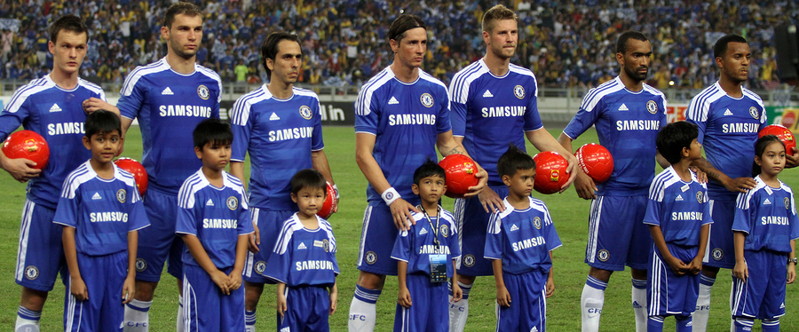
Sometimes referred to as player escorts, child mascots and mascot children, the process of football players being accompanied by a youngster when they walk out ahead of a game is actually a relatively recent one. Look back the World Cup in 1990, for example, and the only children you’ll see are those in the stands.
Even the 1994 FA Cup final was decidedly lacking when it came to children walking out with the players. The final 5 years later did see some children walking out with the players of Newcastle and Manchester United, but there were just 2 of them rather than the virtual army we see nowadays.
Viewers of the European Championships in 2000 will have noticed children accompanying players out onto the pitch, but no real explanation was ever forthcoming about why it happened. The tournament marked the first time that 2 countries had co-hosted the Euros when Belgium and the Netherlands shared the duty, so perhaps it was just seen as a good time to introduce new things! Regardless, the high-scoring nature of the matches meant that it was considered to be one of the best international tournaments in the history of football, so the presence of child mascots certainly didn’t impinge on the quality produced on the pitch.

One of the things that may well have cemented the notion of having a young person accompany footballers onto the field of play ahead of the match might well have been a FIFA declaration that the governing body was to partner with UNICEF for the 2002 World Cup for their ‘Say Yes for Children’ campaign. That was designed to ‘improve and protect’ the lives of children around the world, so it seemed natural for children wearing ‘Say Yes’ t-shirts to accompany every player onto the pitch ahead of all of the games in the tournament that year.
Quite why kids continue to walk out onto the pitch with players nowadays isn’t exactly clear. Some people believe that supporters are less likely to be abusive or act violently towards players if they’ve got a youngster next to them, whilst others believe it’s for little other reason than being a money making exercise for the football clubs. Perhaps the key thing is simply that clubs look good when they have children walking out with the players before a game, which is important at a time when public relations can be crucial for a team’s image.
There’s also the fact that having children as well as players wearing kits as they walk onto the pitch means that there are double the number of spaces for adverts on shirts, which might explain why McDonald’s sent 1,408 kids to the World Cup in Brazil in 2014. Whatever the reason, it’s noteworthy that the vast majority of professional clubs do it and will continue to do so indefinitely.
How To Become A Child Football Mascot
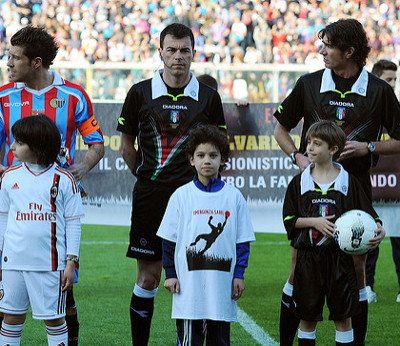
Should you or your child wish to become a player escort then there different requirements that you’ll have to meet depending on the club that you support. In some instances football clubs have arrangements with local schools or junior teams, with the mascots selected from the group of kids involved. I
f you’re keen to be involved on an international level then you’ll likely find that a chief sponsor of a competition or organisation is usually involved in the process in some way. The McDonald’s Player Escort Programme is a good example of this, with the company selecting kids to be involved in numerous tournaments organised by FIFA.
For domestic fixtures, clubs will have their own methods of allowing children to participate, those even these will differ depending on whether or not it’s a friendly match, a cup game or a league encounter. One example of how a club works can be seen in the manner in which Arsenal allowed paid up members of their Junior Gunners initiative to simply fill in a form and enter a ballot to be player escorts at the Emirates Cup.
The majority of Premier League clubs do the same thing, with the most important factor being that children who would like to be a mascot have joined the club’s junior fan scheme.
There are obviously far too many football clubs in England alone, not to mention the rest of the world, for us to tell you how you can become a mascot for each of them, but hopefully this gives you a bit of an idea that you can firm up by having a look at your club of choice’s requirements.
Charging Children To Be Mascots
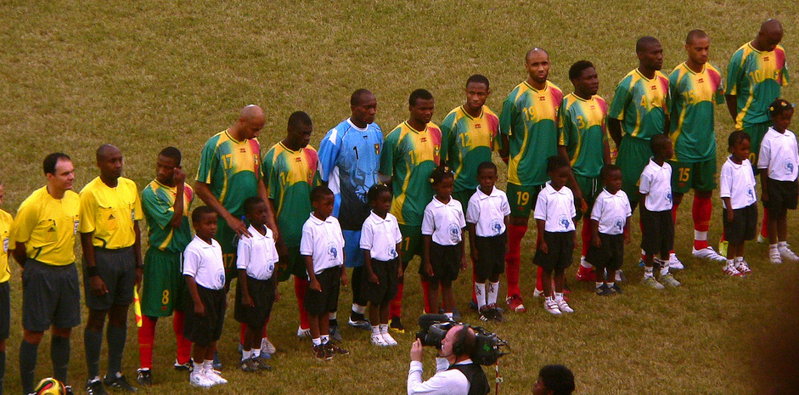
At the start of 2019 it emerged that Swansea City charge Premier League prices for children to be player escorts, in spite of the fact that they had dropped out of the Premier League to the Championship the previous summer.
Research by BBC Wales discovered that parents hoping their offspring could be a mascot for the side would have to pay just shy of £480 for the privilege. That was a price that only 3 Premier League clubs at the time asked for more than, which led to many to brand it ‘outrageous’.
Yet it was also a news topic that led to some people to ask questions. Is it fair that some clubs charge for children to be a mascot whilst others don’t, for example?
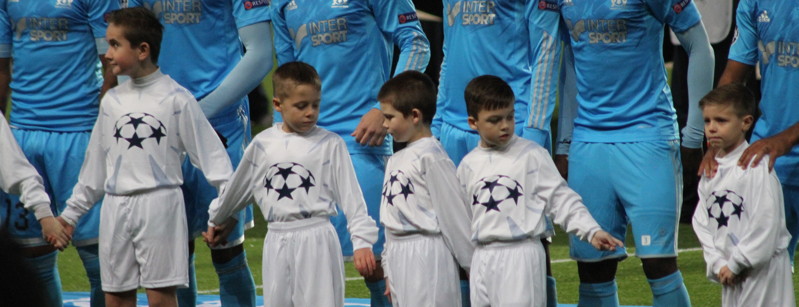
There are examples of clubs such as Everton who charge for children to be mascots for the club’s biggest games of the year, like their derby with Merseyside neighbours Liverpool, and then donate the money raised to charity whilst making it free the rest of the year. Given that they are allowing children from under-privileged backgrounds to be mascots most of the season, is asking parents who can presumably afford it to pay in order to raise money for charity once or twice acceptable?
Even clubs that offer player escort places for ‘free’ don’t really do so, with clubs such as Liverpool, Chelsea and Manchester United picking kids at random from their junior fan clubs. That means that they’ll need to have paid money to be a junior fan, even if it’s only a nominal fee. Is there a huge difference between them and Swansea City, who also offer charity places at every match too? It’s a matter of some debate, with campaign groups predictably being against the idea.
How Much It Costs To Be A Premier League Mascot
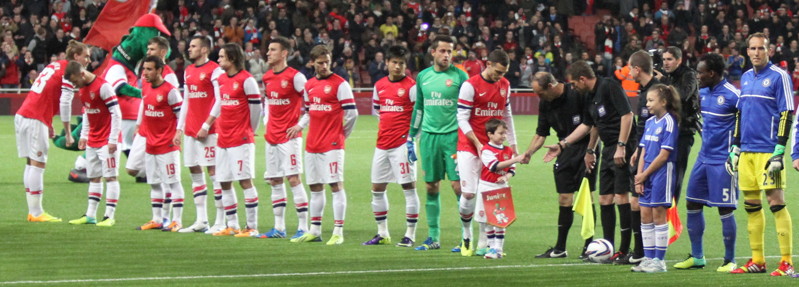
The data on the table at the top of this page is accurate as of the 2018-2019 league season. Teams are constantly looking at their processes and adjusting how much they charge for everything from tickets to the game through to being a player escort.
For that reason, the information given here might not be accurate when you’re reading the piece but will give you some idea of how much you’d have to pay for your child to be a mascot for one of the Premier League or Championship clubs. Importantly it also shows the range of different charges and benefits depending on what team you support.
It’s worth noting that being a mascot isn’t the only thing that payers get for their money, with most football clubs providing the chosen player escort and their family with tickets to then watch the match itself. They also usually get a full kit, professional photographs and a chance to meet and greet the players and manager for a meet and greet ahead of the game.
A signed ball or shirt might also make its way to the participants, with clubs often offering different things to each other. At Crystal Palace, for example, no kit is given to mascots that pay the £225 for the Silver package.
That being said, that isn’t always appreciated by those involved. The mum of a mascot at Cardiff City when they Bluebirds played Manchester City in the 2018-2019 season told the BBC that the ‘seats were poor’ and that the meeting of the players ‘was a bit rushed’. It’s part of why the The Football Supporters’ Federation want clubs to find a ‘good deal’ for fans that go to the match and have youngsters involved in being mascots.
Interesting Child Mascot Stories

It’s not just kids that get to be mascots, you might be interested to know. On top of that, sometimes when it is children there’s still an interesting story accompanying their selection.
Here’s a look at some of the most interesting tales about player escort selections from over the years:
Everton Make History
Everton has long been a football club of firsts, from it being the first club to have under pitch heating through to being the first to stage an FA Cup final, which it did in 1894. It’s perhaps unsurprising, therefore, that they became the first football club to have a child become their mascot in a virtual capacity.
In April of 2018 Jack McLinden was too sick to appear in person at Goodison Park and so was represented by a telepresence robot named AV1. The device allowed the Evertonian to watch, listen and talk to players thanks to the camera, microphone and speaker embedded in it.
Manchester City Invite Older Fans To Act As Mascots
There must have been something in the water in 2018 when it came to mascots, with Manchester City inviting 102-year-old Vera Cohen and her 97-year-old sister along to be mascots for their game against Fulham in the 2018-2019 season. Vera had been going to matches for over 85 years, declaring after the game that there wasn’t even a scoreboard when she started attending games!
Despite Vera’s advanced years, she is not the oldest person to be a mascot at a professional game in England. Preston supporter Bernard Jones was 105 when he led the side out before their game against Sheffield Wednesday on the inaugural fixture of the 2017-2018 campaign in the Championship. Vera and Olga were joined by some kids in the form of Vera’s great-grandsons Sammy, aged 4, and 10-year-old Max.
Amputee Walks Out With Swansea City
It’s not uncommon for football clubs to offer disadvantaged children the chance to lineup as mascots ahead of games, as 11-year-old Callum Williams discovered back in 2015.
The Welsh youngster was born with club feet and they were amputated in June of that year and staff at the hospital where he had the operation done created customisable legs with two shirts that the club had donated.
Ajax Players Select Mums As Mascots
In 2015 the players of Ajax, who were second in the Eredivisie at the time after PSV had already won the title, decided to mark Mother’s Day by walking out onto the pitch with their mums.
The supporters enjoyed the gesture, roaring their side on to a 3-0 win against mid-table team Cambuur at the Amsterdam ArenA.
Stag Do Attendees Play Joke On Groom
A far more amusing story occurred in Blackpool in April of 2018 when lads on a stag doo arranged for the groom to accompany the home team out for their match against Bradford City – unbeknownst to the hapless victim.
Kevin Stuart was clearly unprepared for what was happening to him, as photographs of him wearing a full Blackpool kit and smart shoes testify. At 6 foot 2 inches, he towered over 5 foot 5 inch Jay Spearing who he accompanied.
Sao Paulo Players Take Dogs Out For A Stroll
In September of 2015 the players of Brazilian side Sao Paulo encouraged those living in the city to adopt stray dogs by taking canines out with them instead of kids.
They couldn’t do much to help them once the Brazilian Série A game against Palmeiras got underway, however, with the match ending 1-1.
